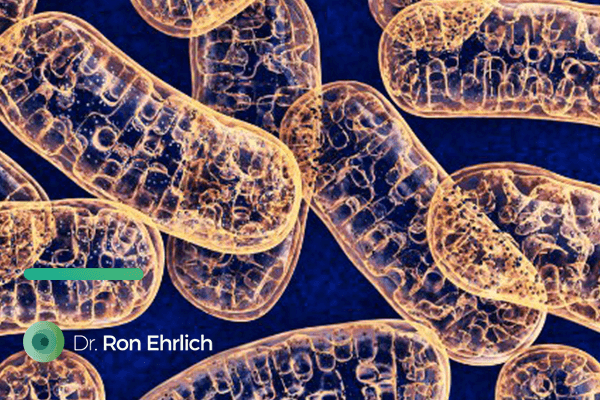What are mitochondria and why are they essential to your health?

If you listen to my podcast, Unstress with Dr Ron Ehrlich, you may have heard the word ‘mitochondria’ come up in a few episodes. Research surrounding mitochondria is fascinating and increasingly pointing to the major role these organelles play in many diseases. It’s a term you will hear more of on upcoming episodes of Unstress and so I wanted to explain it (in very simple terms).
What are mitochondria?
Often referred to as the powerhouses of the cell, mitochondria turns the sugars, fats and proteins we eat into chemical energy that our body uses. Combining these nutrients with oxygen is what produces the majority of energy for our cells. Every living organism consists of millions of cells, which are tiny compartments containing sub-compartments (known as organelles). Each organelle has different functions that keep the cell alive, consequently keeping us alive. Mitochondria is one of these organelles and it provides the energy for keeping our cells and us alive.
Mitochondria produce 90% of the chemical energy we need to survive
However these tiny little organelles do a lot more than creating energy in the cell. They store calcium for cell signaling activities, generate heat and mediate cell growth and death.
Listen: Dr. Ron Ehrlich interviews Jason Bawden-Smith about Mitochondria HQ: Nature’s Solutions. Post continues after audio.
Where do we find mitochondria?
All throughout the body, but in some parts of the body we find mitochondria in higher amounts. Some organs (such as your brain, heart and muscles) need more energy than other organs. Therefore in these areas of the body we will find higher amounts of mitochondria, how much you ask? Well the mitochondria makes up the following volume of these organ’s cells:
- 42% of the cell volume for a heart cell
- 38% of the cell volume for a kidney cell
- 27% of the cell volume for a liver cell
- 8% of the cell volume for a skeletal muscle cell
- 5% of the cell volume for a brain cell
What happens if they don’t function properly?
When the mitochondria in these organs stop functioning as they should and energy production drops then some symptoms may arise. This can include visual loss, kidney wasting, tachycardia, diabetes, liver failure, fatigue or sleep apnea. Additionally low energy from these organelles can lead to depression, migraines, headaches, pain and muscle wasting.
Research is emerging in this field and its something I’m very interested in discussing more with my guests on the podcast. Dr Terry Wahls touched on the role of mitochondria in her episode on Unstress in regards to Multiple Sclerosis. Dr Thomas Seyfried also discussed it in his episode on Unstress in relation to Cancer treatment. Both were fascinating episodes and I encourage you to listen if you haven’t already. There will be more in upcoming episodes on the role it plays in various conditions.
How can we support mitochondria?
The ways we support our mitochondria will vary from person to person and what their condition is. However there are somethings we can do in general to support our mitochondria. Including eating a rainbow of plant foods every day. Each of the different colours contains antioxidants which improve cellular health and protect the mitochondria. A large intake of vegetables will also increase other nutrients such as magnesium, vitamin C, B vitamins and vitamin E which are essential to mitochondrial health. Consume healthy fats and protein to fuel mitochondria, healthy fats are also anti-inflammatory and protective. Incorporate regular movement, the more we move the more mitochondria we produce and the better off we are.
Listen: Dr. Ron Ehrlich interviews Jason Bawden-Smith about Mitochondria: The Role It Plays in Your Health and our Environment. Post continues after audio.
Mitochondria are amazing organelles and there is a lot more to them than what I have outlined to you here. As I said, I just wanted to give you a basic understanding of what they are and what they do so when you hear it referred to on the podcast you have a base line understanding.
